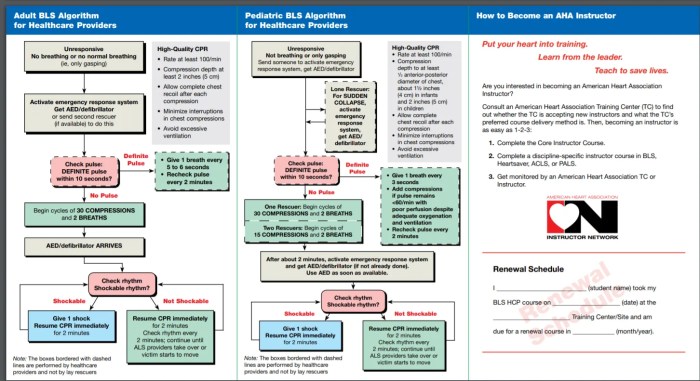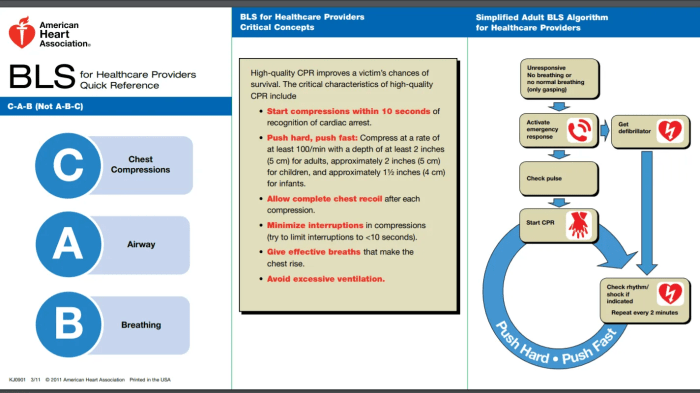The Red Cross CPR Test Answer Key is your indispensable guide to unlocking the secrets of life-saving knowledge. With this key in hand, you’ll embark on a journey of understanding the Red Cross CPR test, acquiring the official answer key, and mastering the key components of the exam.
Get ready to elevate your CPR skills and become a confident first responder.
This comprehensive guide will empower you with the knowledge and strategies to prepare effectively, maximize your performance during the test, and interpret your results accurately. Whether you’re a seasoned professional or a novice seeking certification, this guide will be your trusted companion on the path to becoming a CPR expert.
Understanding the Red Cross CPR Test: Red Cross Cpr Test Answer Key

The Red Cross CPR test is a vital assessment that evaluates an individual’s knowledge and skills in performing cardiopulmonary resuscitation (CPR). This certification is essential for individuals seeking to provide emergency care in various settings.
The test comprises a written exam and a practical skills evaluation. The written exam covers theoretical concepts of CPR, while the practical skills evaluation assesses the participant’s ability to perform CPR effectively.
Test Format
- Written Exam:Consists of multiple-choice questions covering CPR theory, first aid, and emergency preparedness.
- Practical Skills Evaluation:Involves demonstrating CPR techniques on a mannequin, including chest compressions, rescue breathing, and using an automated external defibrillator (AED).
Duration and Scoring System, Red cross cpr test answer key
- Written Exam:Typically lasts for 30-45 minutes, with a passing score of 70% or higher.
- Practical Skills Evaluation:May take up to 15 minutes, and candidates are required to demonstrate proficiency in all CPR techniques.
Acquiring the Answer Key
Obtaining the official Red Cross CPR test answer key is crucial for ensuring accuracy and alignment with the latest guidelines. There are several reliable methods for acquiring the answer key:
From the Official Red Cross Website
The Red Cross website provides access to the most up-to-date answer key. Visit the Red Cross website and navigate to the CPR certification section. From there, you can download the answer key in PDF format.
The Red Cross CPR test answer key is a valuable resource for anyone preparing for the CPR certification exam. If you’re looking for more information on healthy eating habits, check out our fast food nutrition web quest . This comprehensive guide provides insights into the nutritional content of popular fast food items.
Returning to the Red Cross CPR test, the answer key provides detailed explanations of the correct answers, helping you identify areas where you need further study.
From Authorized Red Cross Instructors
Authorized Red Cross instructors have access to the official answer key. If you have attended a Red Cross CPR class, contact your instructor for a copy of the answer key.
Importance of Using the Correct Answer Key
Using the correct and most up-to-date answer key is essential for several reasons:
- Accuracy:The official answer key provides accurate and reliable answers to the test questions, ensuring that you have a clear understanding of the CPR guidelines.
- Consistency:The answer key ensures consistency in grading, ensuring that all test takers are evaluated fairly and accurately.
- Current Information:The answer key reflects the latest CPR guidelines, which are updated regularly to incorporate new research and best practices.
Key Components of the Test
The Red Cross CPR test assesses a comprehensive range of skills and knowledge to ensure the effectiveness of CPR providers in emergency situations. It consists of several distinct sections or modules, each focusing on specific aspects of CPR.
Assessment of Skills
This section evaluates the practical application of CPR techniques. Candidates are required to demonstrate proficiency in performing chest compressions, rescue breathing, and using an automated external defibrillator (AED).
- Chest Compressions:Assesses the candidate’s ability to perform proper hand placement, depth, and rate of compressions.
- Rescue Breathing:Evaluates the candidate’s ability to open the airway, deliver breaths, and check for breathing.
- AED Use:Assesses the candidate’s knowledge and ability to use an AED effectively.
Assessment of Knowledge
This section tests the candidate’s understanding of the principles and theory behind CPR. It includes questions on topics such as:
- Chain of Survival:Understanding the steps involved in providing immediate medical attention to a victim of sudden cardiac arrest.
- CPR Guidelines:Knowledge of the latest CPR guidelines and protocols.
- Risk Factors and Prevention:Understanding the factors that increase the risk of sudden cardiac arrest and measures to prevent it.
Assessment of Scene Safety
This section assesses the candidate’s ability to assess the safety of the scene before approaching a victim and providing assistance. It includes questions on topics such as:
- Scene Assessment:Understanding how to assess the scene for hazards and ensure the safety of the rescuer and victim.
- Universal Precautions:Knowledge of precautions to prevent the spread of infection during CPR.
Preparing for the Test
To ensure your success on the Red Cross CPR test, thorough preparation is essential. Embracing effective study strategies and practice techniques will significantly enhance your confidence and readiness.
Prioritizing practice is paramount. Simulating real-world scenarios through mock tests and drills will familiarize you with the practical aspects of CPR and strengthen your muscle memory. This hands-on approach will ingrain the proper techniques, ensuring their effortless execution during the actual test.
Reviewing Relevant Materials
Complementing practice sessions, a comprehensive review of relevant materials will reinforce your theoretical understanding. The official Red Cross CPR manual serves as an invaluable resource, providing detailed explanations, illustrations, and key concepts. Additionally, supplemental materials such as online tutorials, videos, and practice questions can further enhance your preparation.
Test-Taking Techniques
Maximizing your performance during the Red Cross CPR test requires strategic planning and execution. Effective time management, question comprehension, and answering techniques are crucial for success.
Before the test, familiarize yourself with the test format and question types. This will help you develop a strategy for allocating your time and effort.
Time Management
- Prioritize questions based on your confidence level. Answer the questions you know first to build confidence and save time for more challenging questions.
- Pace yourself throughout the test. Don’t spend too much time on any one question. If you’re unsure, mark it and move on.
- Don’t be afraid to guess. If you’re running out of time, make an educated guess rather than leaving the question blank.
Question Comprehension
- Read each question carefully. Identify the key information and what the question is asking.
- Highlight or underline important details in the question.
- Rephrase the question in your own words to ensure you understand it.
Answering Techniques
- Choose the best answer from the options provided. Eliminate answers that are clearly incorrect.
- If you’re unsure about the answer, consider the context of the question and related knowledge.
- Don’t overthink the questions. Trust your instincts and choose the answer that makes the most sense.
Scoring and Interpretation
The Red Cross CPR test scoring system evaluates the candidate’s proficiency in performing CPR techniques.
The test is typically scored on a scale of 0 to 100%, with a passing score varying depending on the specific certification level.
Scoring Criteria
- Objective Assessment:Evaluates the candidate’s physical performance of CPR skills, such as chest compressions, rescue breathing, and using an automated external defibrillator (AED).
- Written Assessment:Tests the candidate’s knowledge of CPR principles, including the steps of CPR, how to recognize a cardiac emergency, and how to activate the emergency response system.
Interpreting Results
Interpreting the CPR test results involves understanding the following:
- Passing Score:Indicates that the candidate has demonstrated sufficient knowledge and skills to perform CPR effectively.
- Areas for Improvement:Highlights specific areas where the candidate’s performance could be enhanced, such as improving compression depth or providing more effective rescue breaths.
By understanding the scoring criteria and interpreting the test results, candidates can identify areas for improvement and continue to enhance their CPR skills.
Additional Resources

To further enhance your knowledge and skills in CPR, various resources are available online and offline.
Exploring these materials can provide additional support and help you stay updated with the latest CPR techniques and guidelines.
Websites
- American Red Cross: https://www.redcross.org/take-a-class/cpr
- National Safety Council: https://www.nsc.org/safety-training/first-aid-cpr-aed
- Heart and Stroke Foundation of Canada: https://www.heartandstroke.ca/how-we-help/first-aid-and-cpr
Online Courses
- Coursera: https://www.coursera.org/learn/cpr-first-aid
- Udemy: https://www.udemy.com/topic/cpr-first-aid/
- edX: https://www.edx.org/course/first-aid-and-cpr
Other Resources
- CPR training manuals
- CPR practice manikins
- CPR videos and simulations
Commonly Asked Questions
What is the format of the Red Cross CPR test?
The test typically consists of a written exam and a practical skills assessment.
How can I obtain the official Red Cross CPR test answer key?
You can access the official answer key through authorized Red Cross training centers or by contacting the Red Cross directly.
What are the key sections covered in the Red Cross CPR test?
The test covers essential topics such as adult CPR, child CPR, infant CPR, and the use of an automated external defibrillator (AED).
How can I prepare effectively for the Red Cross CPR test?
Practice regularly, attend mock tests, and thoroughly review the official Red Cross training materials.
What is the scoring criteria for the Red Cross CPR test?
The test is scored based on your performance in both the written exam and the practical skills assessment.